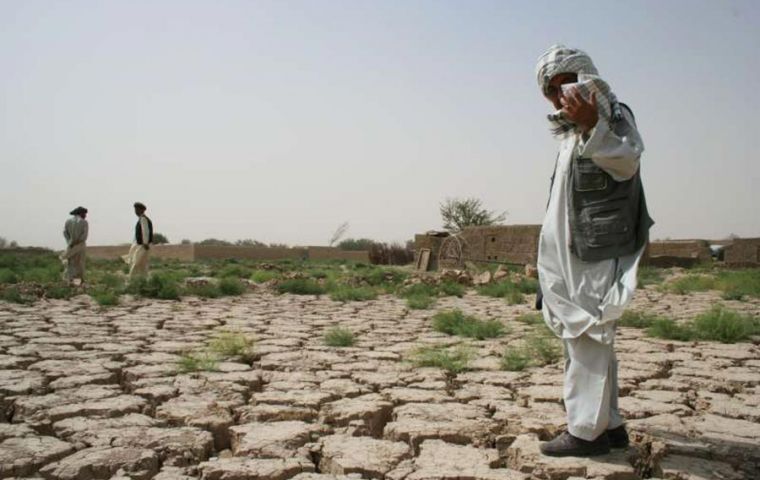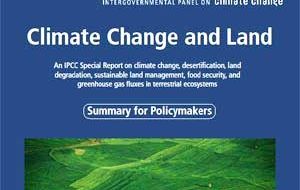MercoPress. South Atlantic News Agency
UN climate change report: farming and eating habits must change to save on land and water
 The report said global population growth and changes in consumption patterns have caused unprecedented rates of land and water use
The report said global population growth and changes in consumption patterns have caused unprecedented rates of land and water use  In a 60-page summary for policymakers, IPCC said that since the pre-industrial period, land surface air temperature has already risen by 1.53 degrees Celsius
In a 60-page summary for policymakers, IPCC said that since the pre-industrial period, land surface air temperature has already risen by 1.53 degrees Celsius 
The way the world manages land produces and eats food has to change to curb global warming or food security, health and biodiversity will be at risk, a UN report on the effects of climate change on land said.
The report said global population growth and changes in consumption patterns have caused unprecedented rates of land and water use. It called for big changes to farming and eating habits, but stopped short of explicitly advocating going meat free.
Dietary changes, featuring plant-based foods and sustainable animal-sourced food, could free up several million square kilometers of land by 2050 and potentially cut 0.7-8.0 gigatons a year of carbon dioxide equivalent, the United Nations' Intergovernmental Panel on Climate Change (IPCC) said in the report.
“Delaying action ... could result in some irreversible impacts on some ecosystems, which in the longer term has the potential to lead to substantial additional emissions from ecosystems that would accelerate global warming,” it said.
The IPCC met to finalize the report this week in Geneva, Switzerland, which should help to guide governments meeting later this year at a conference in Chile on ways to implement the 2015 Paris Agreement and avoid runaway climate change.
Ahead of the report's release, Greenpeace activists in Switzerland unveiled a banner outside the meeting reading “Less Meat=Less Heat. Climate Action NOW!”
In a nearly 60-page summary for policymakers, the IPCC said that since the pre-industrial period, land surface air temperature has already risen by 1.53 degrees Celsius - twice as much as the global average temperature (0.87 C).
Such warming has caused more heat-waves, droughts and heavy precipitation, as well as land degradation and desertification.
Human use directly affects more than 70 per cent of the global, ice-free land surface and agriculture accounts for 70 per cent of freshwater use.
Agriculture, forestry and other land use activities accounted for 23% of total net manmade greenhouse gas emissions during 2007-2016. When pre- and post-production activity in the food system are included, that rises to up to 37%.
“This is a perfect storm. Limited land, an expanding human population, and all wrapped in a suffocating blanket of climate emergency,” Dave Reay, professor of carbon management at the University of Edinburgh said, commenting on the report.
Last year, in the IPCC's first special report, it had already warned that keeping the Earth's temperature rise to 1.5 degrees Celsius, rather than the 2C target agreed under the Paris Agreement, would require rapid changes.
The latest report also warned of more disruption to global food chains as extreme weather events become even more frequent due to climate change.
It projects a median increase of 7.6 per cent in cereal prices by 2050, leading to higher food prices and the increased risk of food insecurity and hunger.
Changes in consumption patterns have already contributed to about 2 billion adults now being overweight or obese, while an estimated 821 million people are still undernourished.
Per capita supply of vegetable oils and meat has more than doubled based on data since 1961 but currently, 25-30 per cent of total food produced is lost or wasted.
Yields of crops such as maize and wheat have declined in some regions, while those of maize, wheat and sugar beets have increased in other regions in recent decades.
Land can be both a source and sink of carbon dioxide emissions, the main greenhouse gas blamed for global warming.
While forests can soak up heat-trapping gases from the atmosphere, desertification and deforestation can amplify warming due to the loss of vegetation cover and soil erosion.
Measures to cut emissions, such as the production of biofuels, bio-char - made from biomass - as well as planting trees, will also increase demand for land conversion.
Reducing deforestation and forest degradation could result in a reduction of 0.4-5.8 gigatons of CO2 equivalent, the report said.
The Amazon, about 60 per cent of which lies in Brazil, is the world's largest tropical rainforest but was not directly mentioned in the summary for policymakers.
The rainforest is sometimes called the “lungs of the world” because of the vast amounts of carbon dioxide its trees absorb.




Top Comments
Disclaimer & comment rules-

-

-

Read all commentsMeanwhile here in the Falkland Islands the Islands Govt Administration dominated by short term contract officers is leading a process of deliberatley clearing and felling many of the few areas of trees we have, in order to curry favour with cash rich businesses and makes no mention of reducing carbon emissions or negating them.
Aug 10th, 2019 - 10:24 am 0Hear, hear Mr. Timlander1...
Aug 10th, 2019 - 01:34 pm 0Any turnip felling a tree in the Falklands (Malvinas) should be fined £1,000 quid on the spot or five days in Her Majesty's B&B...
With the looming 40% EU tariff on every carcass of those half grown rams you Kelpers insist in exporting as lambs.., I can't understand why anybody would even Think about clearing any incredibly valuable forested area in them windblown Islands...
Go get them..., Mr. Miller..
.
Thankyou Think- much appreciated.
Aug 10th, 2019 - 03:13 pm 0Trees are not that easy to get to grow in our windswept part of the world-unless you are way in western Chubut maybe more native ones there in the hills?
Commenting for this story is now closed.
If you have a Facebook account, become a fan and comment on our Facebook Page!